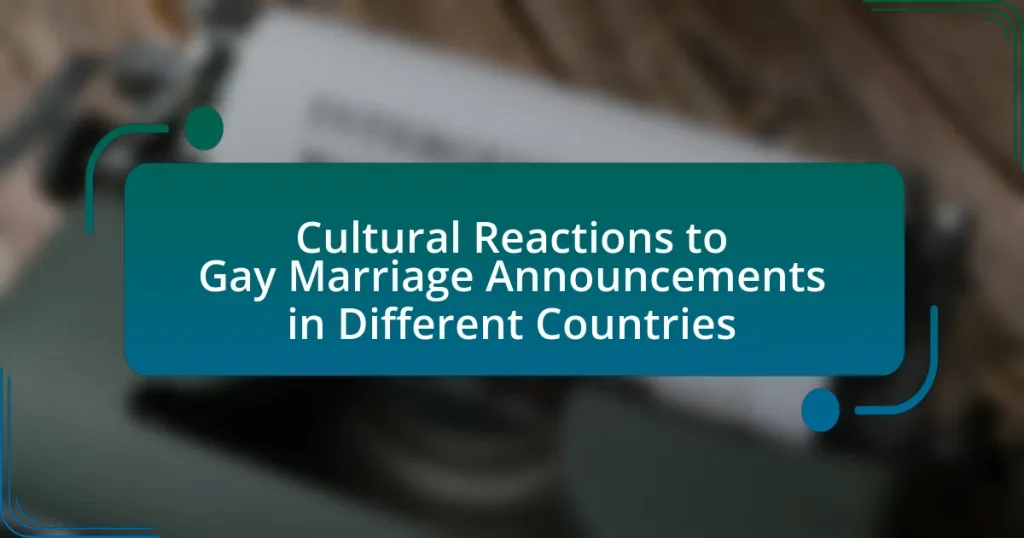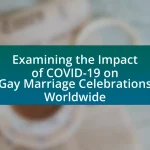The article examines cultural reactions to gay marriage announcements across various countries, highlighting the significant differences influenced by societal values, legal frameworks, and religious beliefs. In Western nations like the United States and Canada, there is generally widespread support and celebration of such announcements, while many Middle Eastern and African countries exhibit severe backlash, including legal penalties and social ostracism. The article further explores how historical contexts, media portrayals, and religious doctrines shape public perceptions and responses to gay marriage, ultimately impacting the LGBTQ+ community’s rights and acceptance globally.
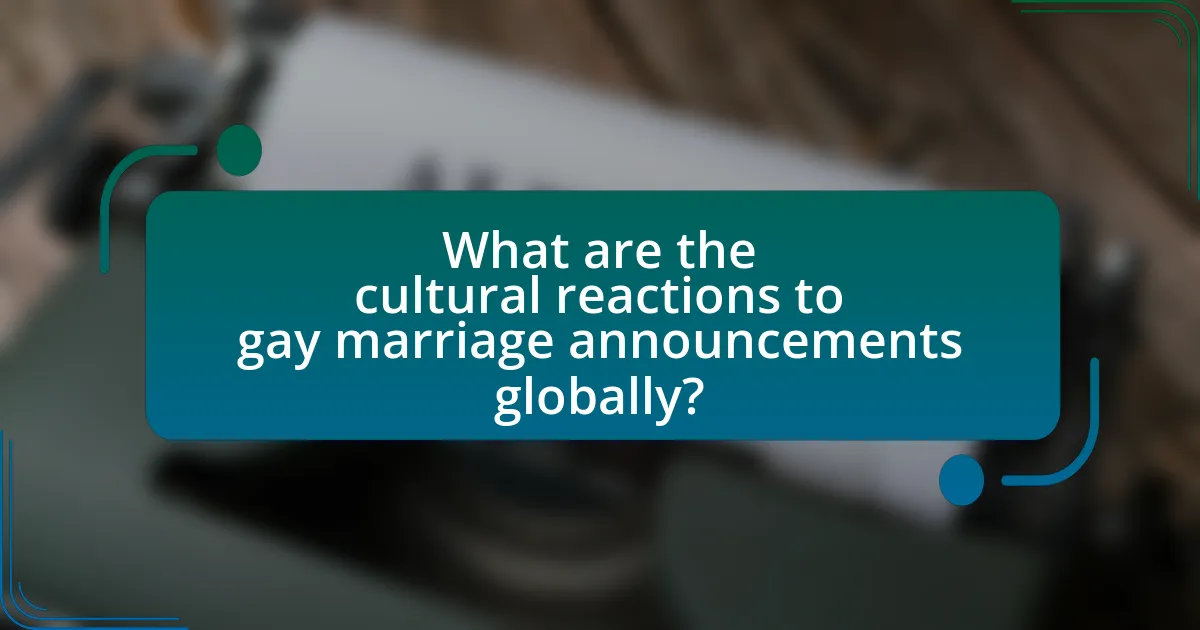
What are the cultural reactions to gay marriage announcements globally?
Cultural reactions to gay marriage announcements globally vary significantly, reflecting diverse societal values and norms. In countries like the United States and Canada, announcements often elicit widespread support, evidenced by public celebrations and legal recognition, as seen in the U.S. Supreme Court ruling in Obergefell v. Hodges in 2015, which legalized same-sex marriage nationwide. Conversely, in many Middle Eastern and African nations, such announcements can provoke severe backlash, including legal penalties and social ostracism, as highlighted by the criminalization of homosexuality in countries like Uganda and Saudi Arabia. In Europe, reactions range from acceptance in progressive nations like the Netherlands, which was the first country to legalize gay marriage in 2001, to resistance in more conservative regions. Overall, cultural responses are shaped by historical, religious, and political contexts, leading to a complex global landscape regarding gay marriage announcements.
How do different cultures perceive gay marriage announcements?
Different cultures perceive gay marriage announcements with varying degrees of acceptance and celebration, often influenced by religious, legal, and social norms. In countries like the Netherlands and Canada, where same-sex marriage is legally recognized, announcements are generally met with support and joy, reflecting a progressive societal attitude. Conversely, in many Middle Eastern and African nations, such as Saudi Arabia and Uganda, gay marriage is illegal and socially stigmatized, leading to negative reactions or outright hostility towards such announcements. Research indicates that cultural attitudes towards LGBTQ+ rights are shaped by historical context, with societies that have a history of colonialism often exhibiting more conservative views.
What factors influence cultural perceptions of gay marriage?
Cultural perceptions of gay marriage are influenced by factors such as religion, legal frameworks, societal norms, and historical context. Religion plays a significant role, as many faiths have specific teachings regarding marriage and sexuality, which can shape community attitudes. Legal frameworks also impact perceptions; countries that recognize gay marriage often exhibit more acceptance, as seen in nations like Canada and the Netherlands, where legal recognition has led to increased social acceptance. Societal norms, including traditional views on gender roles and family structures, further influence how gay marriage is perceived, with more progressive societies generally showing greater acceptance. Historical context, including past movements for LGBTQ+ rights and the visibility of LGBTQ+ individuals in media, also contributes to shaping current attitudes towards gay marriage.
How do historical contexts shape current reactions to gay marriage?
Historical contexts significantly shape current reactions to gay marriage by influencing societal norms, legal frameworks, and cultural attitudes. For instance, countries with a history of colonial laws criminalizing homosexuality often exhibit resistance to gay marriage, as seen in many African and Caribbean nations where colonial-era statutes still impact contemporary views. Conversely, nations like the Netherlands, which legalized same-sex marriage in 2001, reflect a historical trajectory of progressive social movements and legal reforms that foster acceptance. Additionally, the impact of religious beliefs, shaped by historical events such as the Reformation or civil rights movements, continues to inform public opinion on gay marriage, leading to varied reactions across different cultural landscapes.
What role does religion play in cultural reactions to gay marriage?
Religion significantly influences cultural reactions to gay marriage by shaping moral perspectives and social norms. In many societies, religious beliefs dictate views on marriage, often framing it as a sacred union exclusively between a man and a woman. For instance, major religions such as Christianity, Islam, and Judaism traditionally oppose same-sex marriage, leading to cultural resistance in communities where these faiths are predominant. This opposition can manifest in public protests, political lobbying against legalization, and social ostracism of LGBTQ+ individuals. Research indicates that in countries with strong religious affiliations, such as the United States and various Middle Eastern nations, opposition to gay marriage correlates with higher levels of religious observance, as evidenced by surveys showing that religious individuals are more likely to oppose same-sex marriage compared to secular individuals.
How do various religious beliefs impact views on gay marriage?
Various religious beliefs significantly influence views on gay marriage, often leading to polarized opinions. For instance, many conservative branches of Christianity, such as the Catholic Church and certain evangelical denominations, oppose gay marriage based on interpretations of biblical texts that define marriage as a union between a man and a woman. In contrast, more liberal religious groups, including some Protestant denominations and Unitarian Universalists, support gay marriage, advocating for equality and inclusion based on principles of love and justice. Additionally, Islam generally holds traditional views against gay marriage, citing religious texts, while some progressive Muslim communities are beginning to challenge these norms. This divergence in beliefs illustrates how religious doctrine shapes societal attitudes toward gay marriage across different cultures.
What are the differences in religious responses across cultures?
Religious responses to gay marriage announcements differ significantly across cultures, influenced by varying theological interpretations and societal norms. In predominantly Christian countries, such as the United States, responses can range from acceptance and support among progressive denominations to strong opposition from conservative groups, reflecting the diverse theological stances within Christianity. In contrast, Islamic cultures often exhibit more uniform opposition to gay marriage, rooted in traditional interpretations of Islamic texts, leading to widespread condemnation of such unions. Additionally, in countries like Brazil, where Catholicism is prevalent, there is a notable division, with some religious leaders advocating for LGBTQ+ rights while others maintain traditional views. These differences highlight how cultural context shapes religious beliefs and responses to social issues like gay marriage.
How do media portrayals affect cultural reactions to gay marriage?
Media portrayals significantly shape cultural reactions to gay marriage by influencing public perception and acceptance. Positive representations in television, film, and news can normalize gay relationships, leading to increased support for marriage equality. For instance, studies have shown that exposure to LGBTQ+ characters in popular media correlates with more favorable attitudes towards gay marriage; a 2015 study published in the Journal of Homosexuality found that individuals who consumed media featuring positive LGBTQ+ narratives were more likely to support same-sex marriage legislation. Conversely, negative portrayals can reinforce stereotypes and foster discrimination, resulting in cultural backlash against gay marriage. Thus, the media plays a crucial role in either advancing or hindering societal acceptance of gay marriage through its portrayals.
What types of media coverage are most common regarding gay marriage announcements?
The most common types of media coverage regarding gay marriage announcements include news articles, opinion pieces, social media posts, and television segments. News articles typically report on the legal and social implications of the announcements, often highlighting public reactions and statistics related to marriage equality. Opinion pieces provide personal perspectives and analyses, reflecting societal attitudes towards gay marriage. Social media posts amplify these announcements, allowing for immediate public engagement and discussion. Television segments often feature interviews with couples, activists, and legal experts, providing a platform for diverse viewpoints. This coverage is essential in shaping public perception and influencing cultural attitudes towards gay marriage.
How does media framing influence public opinion on gay marriage?
Media framing significantly influences public opinion on gay marriage by shaping the narrative and context in which the issue is presented. For instance, when media outlets emphasize themes of love and equality, public support for gay marriage tends to increase, as seen in studies showing that positive framing correlates with higher acceptance rates. Conversely, when the media frames gay marriage as a threat to traditional values, it can lead to increased opposition, evidenced by surveys indicating that negative portrayals often result in lower support levels. This demonstrates that the way media presents information can directly affect societal attitudes and beliefs regarding gay marriage.
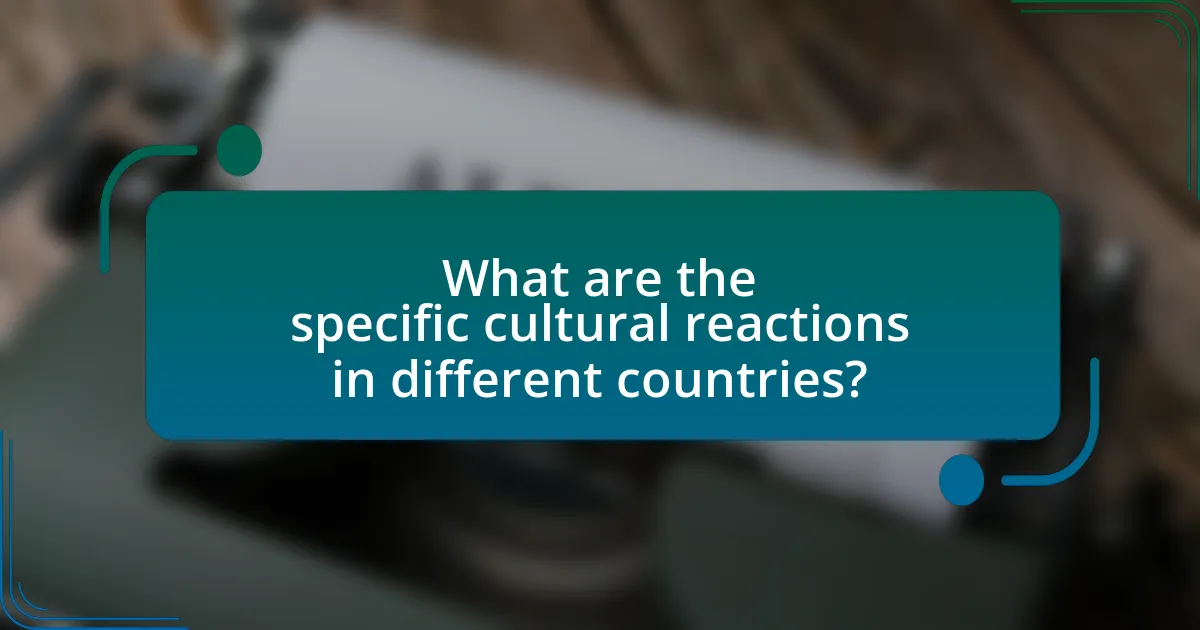
What are the specific cultural reactions in different countries?
Cultural reactions to gay marriage announcements vary significantly across countries. In the United States, reactions have generally shifted towards acceptance, especially following the Supreme Court’s 2015 ruling that legalized same-sex marriage nationwide, reflecting a broader societal trend towards LGBTQ+ rights. Conversely, in countries like Russia, there is widespread opposition, with the government promoting anti-LGBTQ+ sentiments and enacting laws that restrict LGBTQ+ rights, leading to significant cultural backlash against gay marriage. In contrast, nations such as Canada and many Western European countries have embraced gay marriage, viewing it as a fundamental human right, which is evident in their legal frameworks and public support. In regions like the Middle East, particularly in countries such as Saudi Arabia and Iran, cultural reactions are predominantly negative, with severe legal penalties for homosexuality, reflecting deep-rooted cultural and religious beliefs. These varied responses illustrate the complex interplay of cultural, legal, and social factors influencing attitudes towards gay marriage globally.
How do Western countries react to gay marriage announcements?
Western countries generally respond positively to gay marriage announcements, reflecting a growing acceptance of LGBTQ+ rights. For instance, countries like Canada and the Netherlands, which were among the first to legalize same-sex marriage, often celebrate such announcements with public support and media coverage. In the United States, reactions can vary by state, but overall, there is significant support for gay marriage, as evidenced by the 2015 Supreme Court ruling that legalized it nationwide. Public opinion polls consistently show that a majority of citizens in many Western nations favor marriage equality, indicating a cultural shift towards inclusivity and acceptance.
What are the trends in public opinion on gay marriage in Western nations?
Public opinion on gay marriage in Western nations has increasingly shifted towards acceptance and support over the past two decades. For instance, a 2021 Gallup poll indicated that 70% of Americans support same-sex marriage, a significant increase from just 27% in 1996. Similarly, in Canada, support for gay marriage rose from 45% in 2001 to over 80% by 2020, reflecting a broader trend across Western Europe where countries like the Netherlands and Sweden have also shown high levels of acceptance. This growing support is often attributed to increased visibility of LGBTQ+ rights, changing societal norms, and legal advancements, such as the legalization of same-sex marriage in numerous Western nations.
How do legal frameworks in Western countries affect cultural reactions?
Legal frameworks in Western countries significantly shape cultural reactions by establishing norms and values that influence public perception and acceptance of issues like gay marriage. For instance, countries that have legalized same-sex marriage, such as the Netherlands in 2001, often experience more positive cultural reactions, including increased visibility and support for LGBTQ+ communities. Research indicates that legal recognition leads to greater social acceptance, as seen in a 2019 study published in the Journal of Marriage and Family, which found that legalizing gay marriage correlated with a decrease in anti-LGBTQ+ attitudes. Thus, the legal status of gay marriage directly impacts cultural attitudes, fostering an environment of acceptance and inclusivity.
What are the cultural reactions in non-Western countries?
Cultural reactions in non-Western countries to gay marriage announcements often reflect traditional values and religious beliefs, leading to widespread opposition. For instance, in countries like Nigeria and Uganda, strong anti-LGBTQ+ sentiments are prevalent, with laws criminalizing homosexuality and public backlash against any form of acceptance. In contrast, some Asian nations, such as Taiwan, have shown progressive attitudes, becoming the first in Asia to legalize same-sex marriage in 2019, indicating a shift in cultural perspectives. These reactions are influenced by historical, social, and religious contexts, demonstrating a complex landscape of acceptance and resistance across non-Western societies.
How do cultural norms in Asia influence reactions to gay marriage?
Cultural norms in Asia significantly influence reactions to gay marriage, often leading to resistance or opposition due to traditional values. Many Asian societies prioritize family structures and heterosexual norms, which can result in negative perceptions of same-sex relationships. For instance, countries like Japan and South Korea exhibit a mix of increasing acceptance among younger generations and strong opposition from older, conservative demographics. Research indicates that in countries such as India, where homosexuality was decriminalized in 2018, cultural attitudes still reflect deep-rooted stigma, impacting public support for gay marriage. This complex interplay of cultural values and societal expectations shapes the overall response to gay marriage across the continent.
What are the unique challenges faced in African countries regarding gay marriage announcements?
African countries face significant challenges regarding gay marriage announcements, primarily due to deeply entrenched cultural, religious, and legal opposition. Many African nations have laws that criminalize homosexuality, with penalties ranging from fines to imprisonment, which creates a hostile environment for any public acknowledgment of same-sex relationships. For instance, countries like Uganda and Nigeria have enacted stringent anti-LGBTQ+ laws, leading to societal stigma and discrimination against individuals who identify as gay. Additionally, cultural norms in many African societies often prioritize heterosexual marriage, viewing same-sex unions as a threat to traditional family structures. This societal pressure can result in violence, ostracism, and persecution of LGBTQ+ individuals, making it exceedingly difficult for them to advocate for or announce their relationships openly.
How do Latin American countries respond to gay marriage announcements?
Latin American countries exhibit a range of responses to gay marriage announcements, often influenced by cultural, religious, and political factors. For instance, countries like Argentina and Uruguay have legalized same-sex marriage and generally respond positively to announcements, reflecting progressive attitudes. In contrast, nations such as El Salvador and Honduras maintain conservative stances, often resulting in public opposition and legal barriers against gay marriage. The varied responses highlight the region’s complex social landscape, where acceptance and resistance coexist, shaped by historical and contemporary influences on LGBTQ+ rights.
What are the key differences in reactions among Latin American nations?
Latin American nations exhibit varied reactions to gay marriage announcements, influenced by cultural, religious, and political factors. For instance, countries like Argentina and Uruguay have embraced same-sex marriage, reflecting progressive social attitudes and legal frameworks established in the early 2010s, with Argentina legalizing it in 2010 and Uruguay in 2013. In contrast, nations such as El Salvador and Honduras maintain strong opposition, largely due to conservative religious beliefs and societal norms, resulting in legal prohibitions against same-sex marriage. Additionally, Brazil shows a mixed reaction; while same-sex marriage has been legal since 2013, public opinion remains divided, with significant opposition from evangelical groups. These differences highlight the complex interplay of cultural values and legal structures across the region.
How do political climates in Latin America affect cultural responses?
Political climates in Latin America significantly influence cultural responses, particularly regarding social issues like gay marriage. In countries with progressive political environments, such as Argentina, cultural acceptance of gay marriage has increased, leading to widespread celebrations and support for LGBTQ+ rights following the legalization in 2010. Conversely, in nations with conservative political regimes, such as Honduras, cultural responses tend to be more resistant, often reflecting traditional values and resulting in public opposition to gay marriage. This dichotomy illustrates how political ideologies shape societal attitudes, with legislative changes often prompting shifts in cultural norms and public discourse surrounding LGBTQ+ issues.
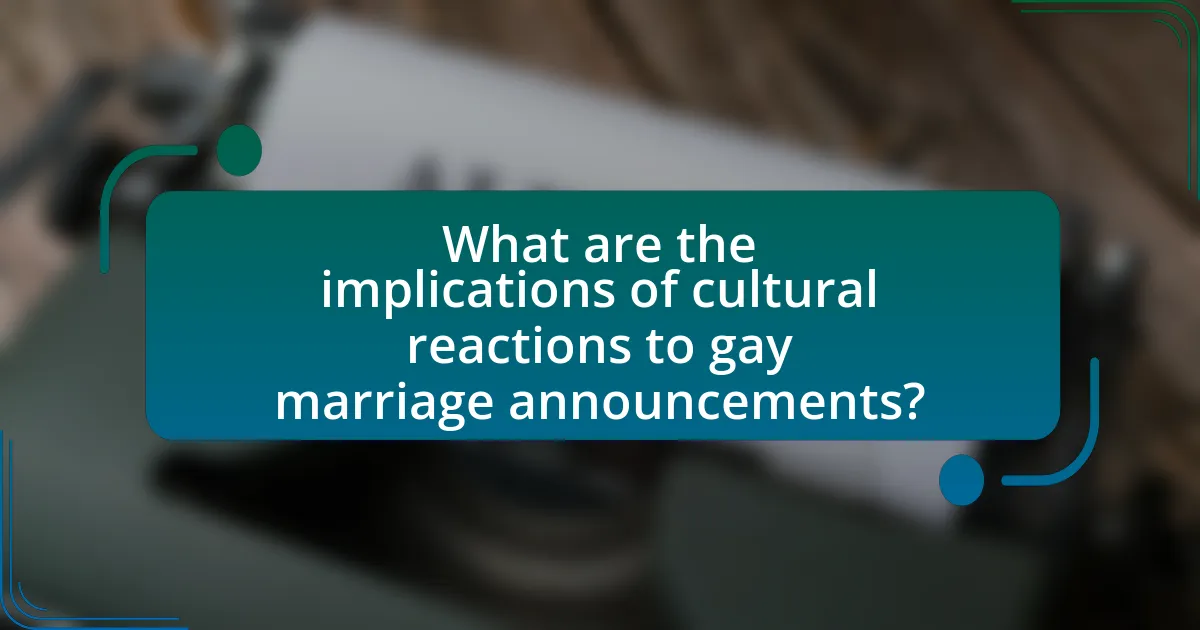
What are the implications of cultural reactions to gay marriage announcements?
Cultural reactions to gay marriage announcements significantly influence societal attitudes and legal frameworks regarding LGBTQ+ rights. Positive reactions can lead to increased acceptance and normalization of same-sex relationships, as evidenced by countries like Canada and the Netherlands, where public support for LGBTQ+ rights grew following the legalization of gay marriage. Conversely, negative reactions can reinforce stigma and discrimination, as seen in nations where such announcements provoke backlash or violence, impacting the mental health and safety of LGBTQ+ individuals. These cultural responses shape public discourse, influence policy changes, and affect the overall progress toward equality for LGBTQ+ communities.
How do cultural reactions impact the LGBTQ+ community?
Cultural reactions significantly impact the LGBTQ+ community by shaping societal acceptance and influencing legal rights. Positive cultural reactions, such as public support for LGBTQ+ rights, can lead to increased visibility, acceptance, and the establishment of legal protections, as seen in countries like Canada and the Netherlands, where supportive cultural attitudes have facilitated the legalization of same-sex marriage. Conversely, negative cultural reactions, including discrimination and stigma, can result in social ostracism, mental health challenges, and legal barriers, as evidenced in countries where anti-LGBTQ+ sentiments prevail, leading to restrictive laws and social exclusion. Thus, the cultural landscape directly affects the lived experiences and rights of LGBTQ+ individuals.
What are the psychological effects of cultural acceptance or rejection of gay marriage?
Cultural acceptance of gay marriage generally leads to positive psychological effects, such as increased well-being and reduced mental health issues among LGBTQ+ individuals. Studies indicate that in societies where gay marriage is accepted, there is a significant decrease in rates of depression and anxiety among LGBTQ+ populations. For instance, research published in the American Journal of Public Health found that states in the U.S. that legalized same-sex marriage saw a 7% reduction in suicide rates among LGBTQ+ youth. Conversely, cultural rejection of gay marriage can result in negative psychological outcomes, including increased stigma, discrimination, and mental health challenges. A study in the Journal of Homosexuality highlighted that individuals in cultures that reject gay marriage experience higher levels of internalized homophobia and social isolation, which can lead to detrimental effects on mental health.
How do cultural reactions influence LGBTQ+ activism and advocacy?
Cultural reactions significantly influence LGBTQ+ activism and advocacy by shaping public perception and policy responses. For instance, in countries where cultural attitudes are supportive of LGBTQ+ rights, activism tends to gain momentum, leading to legal advancements such as the legalization of same-sex marriage. Conversely, in regions with negative cultural reactions, activists often face backlash, which can hinder progress and lead to increased discrimination. A study by the Pew Research Center in 2020 found that acceptance of homosexuality varies widely across cultures, impacting the effectiveness of advocacy efforts. In cultures with high acceptance, such as in many Western nations, LGBTQ+ advocacy has successfully led to significant legal reforms, while in more conservative cultures, activists often must navigate hostile environments, which can stifle their efforts.
What lessons can be learned from cultural reactions to gay marriage announcements?
Cultural reactions to gay marriage announcements reveal significant lessons about societal attitudes and the evolution of acceptance. Firstly, these reactions often highlight the divide between progressive and conservative values within different communities, indicating that acceptance of gay marriage is frequently correlated with broader social changes, such as increased visibility of LGBTQ+ issues and advocacy. For instance, in countries like the Netherlands, which legalized gay marriage in 2001, public support has grown over time, reflecting a shift towards greater inclusivity. Conversely, in regions where traditional values dominate, such as parts of Eastern Europe, announcements may provoke backlash, underscoring resistance to change. This dichotomy illustrates that cultural context plays a crucial role in shaping responses, emphasizing the importance of ongoing dialogue and education to foster understanding and acceptance.
How can understanding cultural reactions improve advocacy strategies?
Understanding cultural reactions can significantly enhance advocacy strategies by allowing advocates to tailor their messages and approaches to resonate with specific cultural values and beliefs. For instance, research indicates that in countries where traditional family structures are highly valued, framing gay marriage advocacy in terms of family unity and love can lead to greater acceptance. A study by the Pew Research Center found that cultural context influences public opinion on LGBTQ+ issues, demonstrating that advocates who acknowledge and respect local cultural sentiments are more likely to foster dialogue and reduce resistance. By aligning advocacy efforts with cultural norms, advocates can create more effective campaigns that engage communities and promote understanding.
What best practices can be adopted to foster acceptance of gay marriage globally?
To foster acceptance of gay marriage globally, education and awareness campaigns are essential. These initiatives should focus on dispelling myths and stereotypes about LGBTQ+ individuals, promoting understanding and empathy through inclusive curricula in schools and community programs. Research indicates that countries with comprehensive sex education that includes LGBTQ+ topics show higher levels of acceptance; for instance, a study by the Williams Institute found that increased visibility and representation of LGBTQ+ issues in media correlate with greater societal acceptance. Additionally, legal reforms that protect LGBTQ+ rights and promote marriage equality can create a supportive environment, as seen in countries like Canada and the Netherlands, where legal recognition has led to increased social acceptance.
What strategies can be employed to navigate cultural reactions to gay marriage?
To navigate cultural reactions to gay marriage, individuals and advocates can employ strategies such as fostering open dialogue, promoting education, and leveraging media representation. Open dialogue allows for the exchange of perspectives, which can reduce misunderstandings and build empathy. For instance, community forums and discussions can create safe spaces for individuals to share their experiences and concerns. Promoting education about LGBTQ+ rights and history can challenge stereotypes and misinformation, as evidenced by studies showing that increased awareness leads to greater acceptance. Additionally, leveraging media representation through positive portrayals of same-sex couples in television and film can influence public perception, as research indicates that visibility can normalize and humanize LGBTQ+ relationships. These strategies collectively contribute to a more inclusive cultural environment regarding gay marriage.
